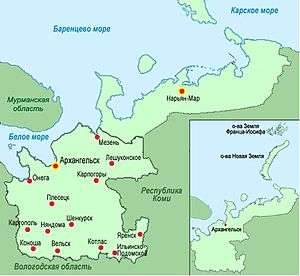Arkhangelsk Regional Rescue Service

The Arkhangelsk Regional Rescue Service (ARRS) was founded by the governor of Arkhangelsk Oblast, Russia on 6 April 1998 to provide emergency assistance and preparedness in dealing with a variety of emergency situations. It operates under the jurisdiction of the Agency for Fire Protection and Civil Defence of Arkhangelsk Oblast. The head of the ARRS since 1998 was Igor Polivany. June 24, 2013, after a long and serious illness, Igor Polivany died. In gratitude for his contribution to the development of Search and Rescue in Russia, the memory of this unique man and professional was immortalized. Arkhangelsk Regional Rescue Service was named after Igor Polivany. The head of the ARRS since August 2013 has been Vadim Drobot.
Organisation
- Financial department
- Response department
- Search and rescue brigade
- Specialized fire brigade №17
- Emergency call centre
- Special defence department
- Canine department
- Medical department
- Operations technical support department
- Communications department
- Transport department
- Special equipment department
- Managerial department
- Service activities department
- Human resources department
- Training department
Emergency call centre
Specialists at the emergency call centre co-ordinate the participation of the search and rescue brigade in actual and simulated rescue operations and cooperate with other emergency organizations in the Arkhangelsk region 24 hours a day. Since its inception, the ARRS has received more than 668,000 calls from the population and organisations for a variety of emergency situations. One of the most important functions of the emergency call centre is guiding (by telephone) people who become lost in the forest. From 2004 to 2011, nearly 700 people were guided out of the forest.
Rescue operations
Members of the ARRS have considerable experience in rescue missions, including fire fighting, rescuing survivors after plane crashes, mitigation of large-scale chemical accidents and explosions of the blocks of flats. Since 1998, the SAR brigades of the ARRS have conducted almost 42,000 rescue operations; nearly 4,000 people were rescued.
In 2007, an Aviation Rescue Swimmer division was established in ARRS in order to help the injured on sea. Specialized training programmes for rescue swimmers are based on the best practices of American and Norwegian rescue services. The aviation rescue swimmers division of ARRS is the only such unit in the northwest of Russia.
Hazmat response
Members of the special defence section assess of the impact of chemical, biological and radioactive contamination, using measuring devices to control the level of hazardous materials in the environment. In addition, specialists in this section participate in rescue operations in chemical accidents. Since 2006, the ARRS has mitigated dangerous substances. Decontamination services were not provided in the Arkhangelsk region before the formation of the ARRS. From 2006 to 2011, specialists of the ARRS mitigated adverse effects from 46 damaged methyl bromide cylinders, 1820 chlorine cylinders, 800 liquid chlorine containers, 29 ammonia cylinders, 7.5 tons compressed and ammonia gas from refrigeration equipment, 5 acetylene, 5 hydrogen cylinders, and 5 methane cylinder.
ARRS is the only emergency organisation in the northwest of Russia certified for providing Hazmat activities concerning with leaks, emissions, and spills of chemicals.
The rescuers of ARRS conduct Hazmat activities not only within the Arkhangelsk Oblast. In September 2011, they drove over 3,5000 km from Arkhangelsk to Nyagan (Khanty-Mansi Autonomous Okrug) in order to eliminate a storage of liquefied chlorine.
Canine brigade
At the end of September 2003, two German shepherd puppies were selected for training. In June 2005, the dogs were certified as ready to provide rescue missions by passing two tests: searching for survivors in an inhabited area and in the forest. The same year, they were awarded the bronze medal in the EMERCOM regional Russian competition for SAR canine brigades. In 2012, the three canine brigades of the ARRS were re-certified Class A at the certification competition.
Psychological assistance
Psychologists in the ARRS provide emergency psychological assistance to the population by telephone. If necessary, they join rescuers to provide psychological assistance to potential suicides and work with relatives of accident victims or people lost in the forest. The psychologists' conclusions concerning a person lost in the forest help rescuers decide on a search strategy.
Public-safety education
Specialists in the ARRS have developed and implemented preventive lectures on safety for the student population of the Arkhangelsk region. Audiences vary, from children 5–6 years of age to students at higher-educational institutions. Based on these presentations, the ARRS has developed two additional education programmes: a “Safety School” focused on children with cognitive impairment, and “Five Steps of Safety”, adapted for older preschool children. At the 2008 and 2009 Moscow exhibitions "Fire Safety in the 21st Century", specialists in the ARRS were awarded certificates and gold medals.
-

Direct deployment
-

Gas explosion in a multiple dwelling
-
Searching for missing persons
-
Rescue operation in construction collapse
-

Training of rescue swimmers
-

Identifying hazardous materials
-

Safety talk in school
-

Rescue in road accident
-

Firefighting
-

Mitigating hazardous materials
-

Sea rescue
-

Air deployment of rescuer and dog
See also
References
External links
- Arkhangelsk Regional Rescue Service (Russian)
Coordinates: 64°31′39″N 40°34′25″E / 64.52750°N 40.57361°E
- Arkhangelsk Regional Rescue Service (Russian)